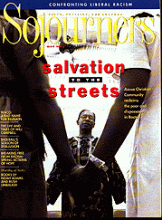North Korea's announcement in March that it would no longer be bound by the nuclear Non-Proliferation Treaty was met with international alarm and approbation. But some observers feel the most significant proliferation issue today revolves not around North Korea's attempts to acquire the bomb -- nor even that of Iran or Iraq -- but rather the supposedly secret nuclear arsenal of Israel.
Israel's nuclear weapons program "presents a tremendous danger in this fragile region," Israeli peace activist Gideon Spiro told Sojourners. "We're certainly happy that Iraq is in the process of dismantling its weapons of mass destruction, but if you neglect the Israeli bomb you cannot prevent others from having it." A senior Iranian official, for example, told the German weekly Stern last year that Israel's nuclear arsenal "leaves us no choice but to acquire the same weaponry."
The Israeli government and its supporters in the West -- including the U.S. government -- have for decades ignored or denied the existence of Israel's nuclear arsenal. The conspiracy of silence was broken in 1986 when a technician at Israel's nuclear production plant near Dimona revealed to the London Sunday Times that Israel had as many as 200 state-of-the-art nuclear weapons, putting Israel's arsenal on a level with that of China, France, and Great Britain.
The worker who blew the whistle on the "secret" Israeli weapons -- Mordechai Vanunu -- was kidnapped in Europe that year by the Israeli Mossad and, after a secret trial, sentenced to 18 years in solitary confinement -- in conditions Amnesty International has called "cruel, inhuman, and degrading." Spiro, head of a Jerusalem-based group working to secure Vanunu's release, believes Vanunu is being persecuted because he said things that "nobody wanted to hear."
Read the Full Article

